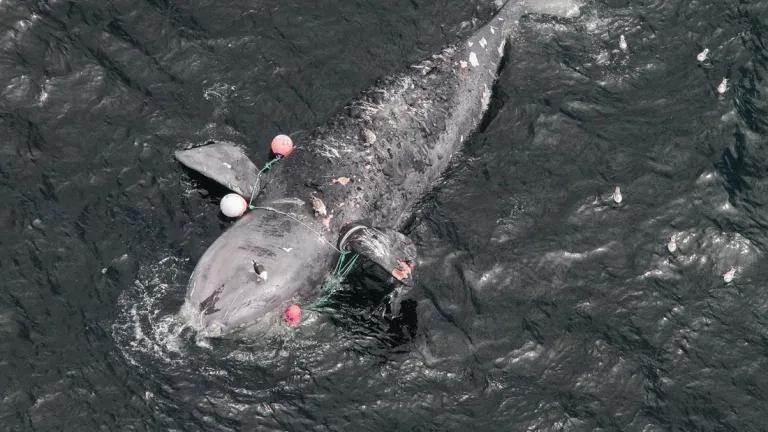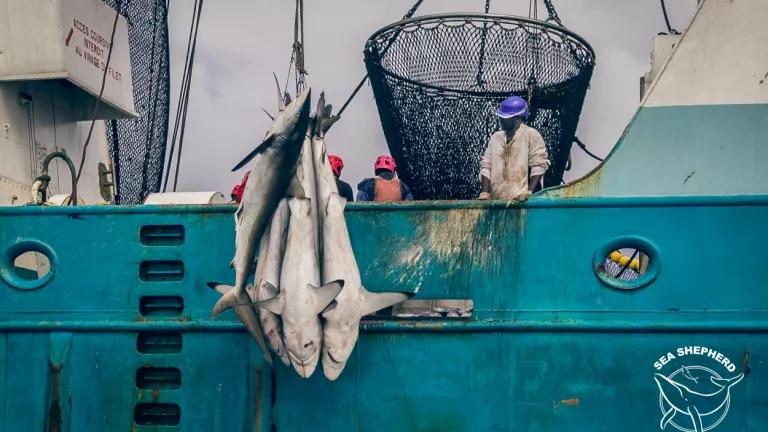Right Whale Dealt Terrible Blow in Omnibus
This rider is a rebuke of deliberative policy, respect for science, and the fundamental commitment that this country has made, through its laws and traditions, to protect our most endangered species.

Entanglements in fishing gear used by lobster and crab fisheries are the leading cause of North Atlantic right whale deaths and the species' overall decline
On the 50th anniversary of the Marine Mammal Protection Act (MMPA), Congress is poised to pass a bill that may doom the critically endangered North Atlantic right whale to extinction.
Hidden within the end of year must-pass omnibus spending package, the Maine delegation squeezed in an 11th-hour provision that undermines the bedrock environmental laws protecting the whale from fishing gear entanglements. The impact this language will have on the species and the dangerous precedent it sets for congressional override of science-based laws is deeply concerning.
Entanglement in vertical buoy lines associated with pot/trap fishing gear, such as those used by the American lobster and Jonah crab fisheries in the Gulf of Maine, is the leading cause of death, serious injuries, sublethal impacts like ill health and impaired reproduction, and overall decline of North Atlantic right whales.
With only about 340 North Atlantic right whales left in 2021, and of those fewer than 70 reproductive females, the right whale cannot survive with the current rate of entanglement. Deaths from entanglement in the American lobster and Jonah crab fishery are almost six times what the species can withstand. Without immediate action to reduce those deaths to fewer than one per year, science tells us that the species will soon reach a point of no return.
NRDC strongly believes that right whales and lobstermen can coexist. Solutions are available, such as ropeless (or “on-demand") fishing gear, that virtually eliminate entanglements while keeping fishermen on the water. This, however, is not the route the Maine delegation took.
Instead, they designed a provision that freezes the status quo in place for six years, until the end of 2028. Over this time the fisheries will only have to abide by the terms of an illegal 2021 regulation that a federal court ruled was insufficient to reduce entanglement risk to sustainable levels. The Atlantic Scientific Review Group, the body entrusted by Congress with assessing the conservation status of marine mammals, made clear what the effects of such a rider would be. The amendment, they wrote, “would likely doom the North Atlantic right whale to extinction.”
The language also strikes at the very heart of the Endangered Species Act (ESA) and Marine Mammal Protection Act (MMPA). This kind of anti-conservation rider—unvetted and inserted at the last minute into a budget bill—makes a mockery of the science-based decision-making that animates those statutes as well as of the country’s basic commitment to wildlife. If an iconic, endangered whale can be sacrificed in this way, what wildlife species is safe?
The situation facing the fishery is not an environmental train wreck. The National Marine Fisheries Service and the scientific and conservation communities all agree that transitioning to ropeless gear, which is already being used commercially in other fisheries here and internationally, would eliminate the conflict with right whales and make the fisheries sustainable. Ropeless gear also benefits fisheries by obviating the need for fishery closures to protect whales from entanglement, providing a more stable supply of seafood even with the increasingly unpredictable effects of climate change.
Federal dollars could assist with the costs of transition to ropeless gear, eliminating the only material obstacle to sustainability. But in freeing the fisheries from the requirements of the MMPA and ESA, the provision eliminates the legal standards that are driving towards this solution. And while—thanks to the intervention of some helpful members of Congress—the rider authorizes funding for "innovative gear” over the next ten years, there is no guarantee that the money will actually be appropriated. That will be the decision of the appropriations committee—and it is imperative those monies are prioritized. With the help of federal funding to transition the fishery, and absent further human driven decline, the right whale can recover and the lobster fishery can continue to fish.
This rider is a rebuke of deliberative policy, respect for science, and the fundamental commitment that this country has made, through its laws and traditions, to protect our most endangered species. Over the next six years, the iconic right whale is likely to continue to decline, with maximum pain and agony. And in the end, by weakening the incentive to transition to ropeless gear, the delegation’s gambit is only likely to harm the fisheries they purport to represent—to lead, in six years, to a train wreck that is so readily avoidable.
In six years’ time, when the freeze on agency action ends, it might already be too late to bring this species back or there may not be the political will to do so. What species will come next that Congress decides is not worth saving due to short-sighted industry interest?




